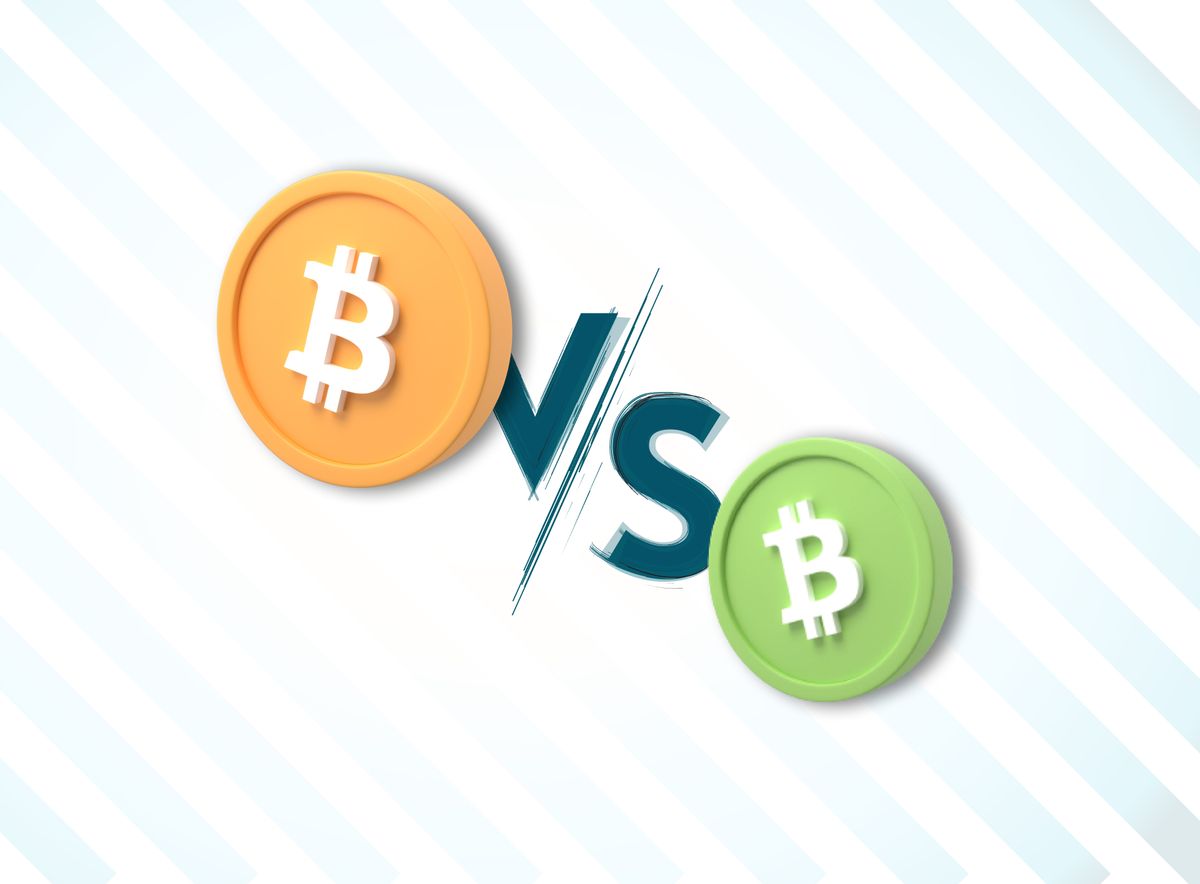Bitcoin vs. Bitcoin Cash: Key Differences Explained
Bitcoin and Bitcoin Cash may sound similar, but they have major differences. Learn how they compare in speed, fees, scalability, and use cases.

Bitcoin and Bitcoin Cash could be called parent and child. They share the same genetic coding but have distinct differences.
In this article, we explain both cryptocurrencies, their market caps, transaction speeds, and prices, and how they can fit into your trading portfolio.
What is Bitcoin?
Bitcoin, often referred to as the original cryptocurrency, was introduced in 2009 by an anonymous person or group of people using the pseudonym Satoshi Nakamoto.
It operates on a decentralized network known as 'blockchain', which ensures transaction transparency, security, and immutability.
Bitcoin's primary purpose is to serve as a decentralized digital currency that can be used for peer-to-peer transactions, store of value, and investment.
With a finite supply capped at 21 million coins, Bitcoin has gained immense popularity over the years and has become a store of value for many investors.
What is Bitcoin Cash?
Bitcoin Cash emerged as a result of a hard fork in the Bitcoin blockchain in August 2017. A hard fork in crypto is when significant changes are made to a cryptocurrency's code.
These changes create an entirely new blockchain network incompatible with the old one. Think of it like a road that gets split in two, and you have to decide which way you want to go.
When a cryptocurrency undergoes a hard fork, a new cryptocurrency is created.
However, people who owned the original cryptocurrency before the fork still have the same amount of coins or tokens in both the old and new cryptocurrencies, provided they have their private keys.
A hard fork occurs for different reasons, such as enhancing the features of a cryptocurrency, resolving disputes among its users, or increasing security.
The primary motivation behind the creation of Bitcoin Cash was to address certain limitations of the original Bitcoin, mainly scalability and transaction speed.
Bitcoin Cash aimed to offer faster and cheaper transactions to enable everyday use as a medium of exchange.
Bitcoin Cash shares many similarities with Bitcoin, including its decentralized nature and blockchain technology. However, it diverges in terms of its block size. Bitcoin Cash increased the block size from 1 MB to 8 MB, allowing more transactions to be processed per block.
Bitcoin vs Bitcoin Cash: Market Cap
When comparing the market capitalization of Bitcoin and Bitcoin Cash, Bitcoin currently holds a significantly higher market cap.
Bitcoin has a market cap of $517 billion, while Bitcoin Cash has a market cap of $2.1 billion.
As the pioneer in the cryptocurrency space and with widespread adoption, Bitcoin's market cap has soared to new heights, making it the largest and most dominant cryptocurrency by market value.
Bitcoin Cash, although still a substantial player, has a much smaller market cap in comparison.
Bitcoin vs Bitcoin Cash: Price
Bitcoin's price has experienced remarkable volatility throughout its history, with dramatic increases and sharp corrections.
Bitcoin has seen numerous bull and bear cycles, often capturing the attention of investors and enthusiasts. Bitcoin's price is often seen as an indicator of the overall health and sentiment of the cryptocurrency market.
Bitcoin Cash, because it is a relatively younger cryptocurrency, has had fewer significant price fluctuations. However, its price tends to be lower than Bitcoin's, primarily due to its smaller market cap and lesser adoption.
Bitcoin vs Bitcoin Cash: Transaction Speed
Transaction speed is a crucial factor when it comes to cryptocurrencies, as it determines how quickly transactions can be confirmed and settled.
Bitcoin has faced scalability challenges, leading to slower transaction times during periods of high demand. The average block time for Bitcoin is around 10 minutes, which can cause delays and higher fees when the network is congested.
With its larger block size, Bitcoin Cash aims to address this issue. It offers faster transaction speeds and lower fees compared to Bitcoin.
The average block time for Bitcoin Cash is approximately 10 minutes as well.
Still, with its increased block size, it can process more transactions per block, potentially reducing congestion and improving overall transaction speed.
Bitcoin vs Bitcoin Cash: Which is better for your portfolio?
Choosing between Bitcoin and Bitcoin Cash for your investment portfolio ultimately depends on your investment goals, risk tolerance, and beliefs about the future of cryptocurrencies.
Bitcoin is widely regarded as the most established and dominant cryptocurrency, with a larger user base, higher liquidity, and greater institutional adoption.
As a long-term store of value, Bitcoin has proven its resilience and potential for substantial returns.
On the other hand, Bitcoin Cash appeals to those seeking faster and cheaper transactions, particularly for everyday use.
Its larger block size allows for more scalability, potentially enabling a smoother user experience.
However, Bitcoin Cash's smaller market cap and lesser adoption may present higher volatility and potentially lower returns than Bitcoin.
Final Word
Bitcoin and Bitcoin Cash have unique characteristics and purposes within the cryptocurrency landscape.
Bitcoin's status as the pioneer and dominant player makes it a popular choice for investors seeking a long-term store of value.
With its focus on transaction speed and lower fees, Bitcoin Cash may appeal to those looking for a cryptocurrency better suited for everyday transactions.
Understanding your investment objectives and conducting thorough research will guide you in deciding which cryptocurrency aligns best with your portfolio and long-term investment strategy.
Disclaimer: This article was written to provide guidance and understanding. It is not an exhaustive article and should not be taken as financial advice. Obiex will not be held liable for your investment decisions.



